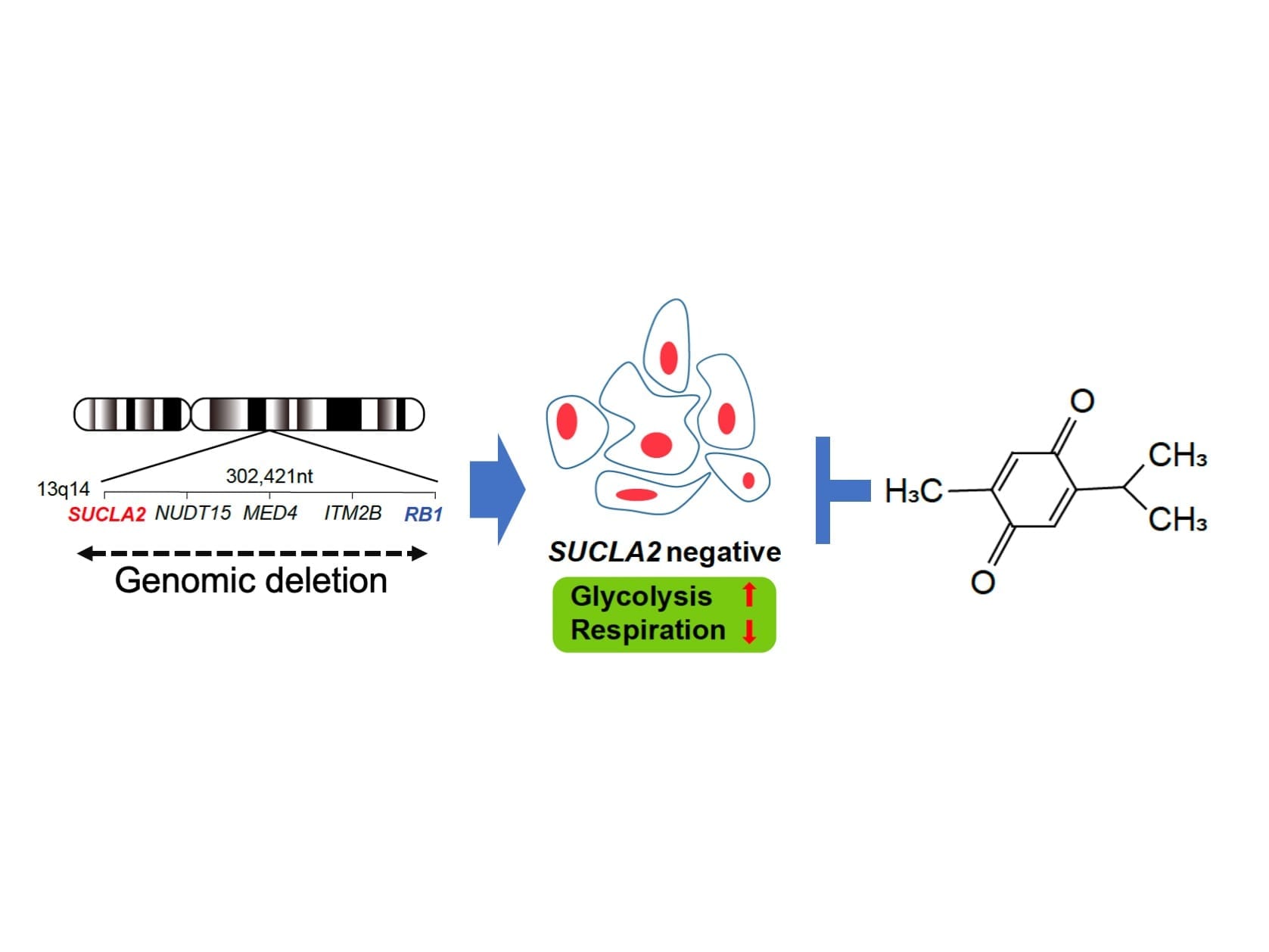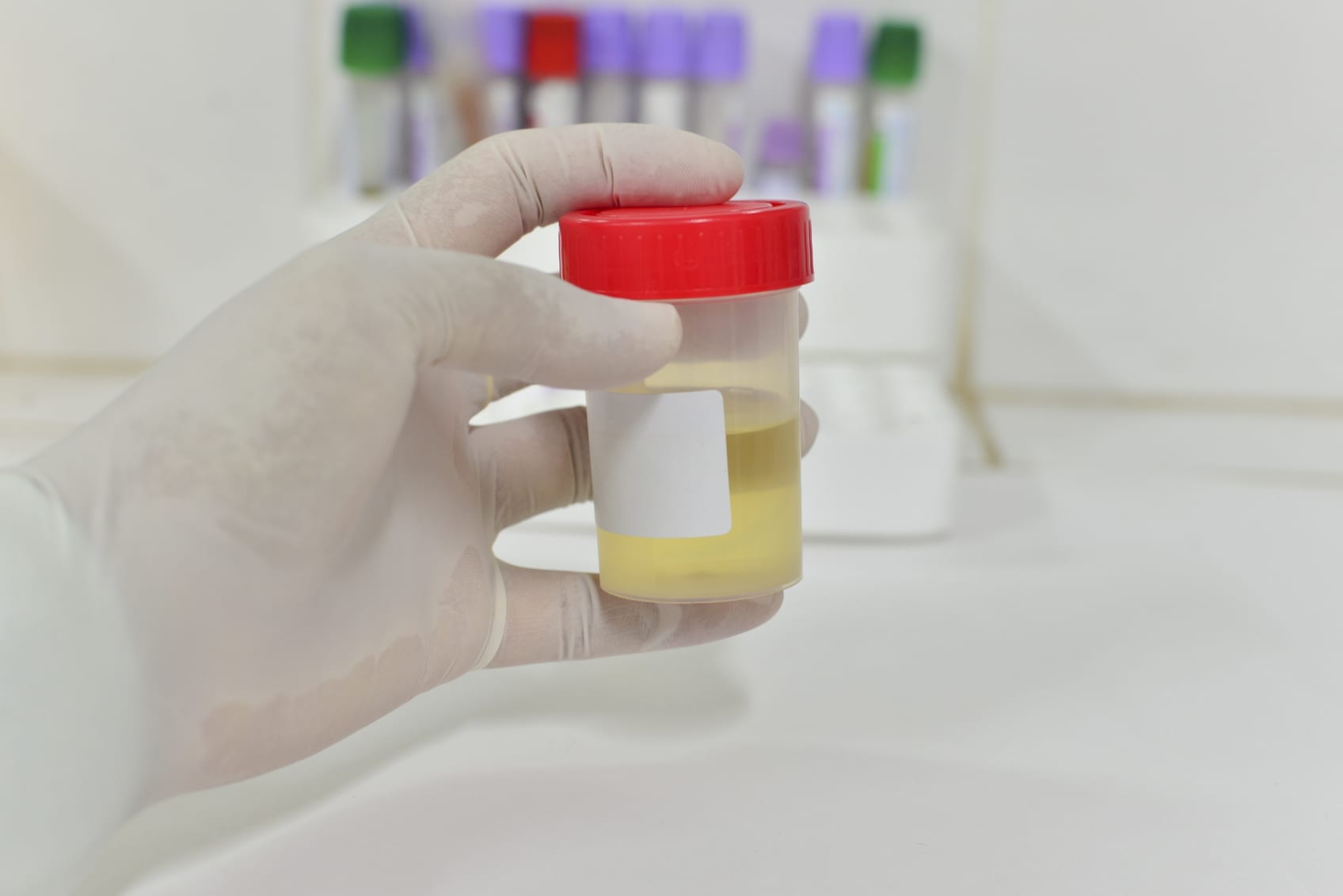
Graphical abstract
SUCLA2 gene is frequently involved in the deletion of RB1 gene region, which occurs in 10 – 30 % of advanced prostate cancers. SUCLA2 deletion gives rise to a metabolic vulnerability. By screening chemical compounds, thymoquinone appeared to selectively kill SUCLA2-deficeint prostate cancer cells.
Kanazawa University researchers reported that the SUCLA2 gene is frequently involved in the deletion of the tumor suppressor gene RB1 in advanced prostate cancer. RB1 deletion makes cells resistant to hormone therapy but SUCLA2 deletion induces a metabolic weakness. The study showed that thymoquinone selectively killed SUCLA2-deficient prostate cancer cells in vitro and in vivo. The findings highlight a vulnerability of advanced prostate cancer cells that can be targeted by drugs.
The compound thymoquinone (TQ) selectively kills prostate cancer cells at advanced stages, according to a new study published in Oncogene. Led by researchers at Kanazawa University, the study reports that prostate cancer cells with a deletion of the SUCLA2 gene can be therapeutically targeted. SUCLA2-deficient prostate cancers represent a significant fraction of those resistant to hormone therapy or metastatic, and a new therapeutic option for this disease would have immense benefits for patients.
Hormone therapy is often chosen for the treatment of metastatic prostate cancer but nearly half of patients develop resistance to the treatment in as little as 2 years. A mutation in RB1, a tumor suppressor gene that keeps cell growth under control, has been pegged as a particularly strong driver of treatment resistance and predicts poor outcome in patients.
“Mutations in tumor suppressor genes are enough to induce initiation and malignant progression of prostate cancer, but so far we haven’t been able to directly target these mutations with drugs to treat prostate cancer,” says the lead author Susumu Kohno. “We wanted to find a genetic aberration associated with that of a tumor suppressor gene which we could target therapeutically.”
In the genome, SUCLA2 neighbors RB1. An analysis of prostate cancer cells showed that cells with a RB1 deletion were also missing SUCLA2, pairing up the SUCLA2 deletion with the RB1 deletion present in advanced stage prostate cancer. Kohno and colleagues analyzed prostate cancer tissue and found that 11% of cases were missing both SUCLA2 and RB1.
The researchers screened compounds to identify drugs that would selectively kill cells with a SUCLA2 deletion. Out of around 2,000 compounds, TQ emerged as a hit compound. TQ already has known anti-cancer effects and was shown to be safe in a phase I clinical trial. Kohno and colleagues applied the TQ treatment to a mouse model of SUCLA2-deficient prostate cancer and TQ selectively suppressed tumor growth.
“These findings show that TQ treatment could be an effective therapy for treating prostate cancer cells that harbor SUCLA2 deficiency” says the senior author Chiaki Takahashi.
In a search of genetic databases from patients with prostate cancer, the researchers found that the frequency of SUCLA2 loss was almost perfectly aligned with RB1 loss at every disease stage—meaning the SUCLA2 deletion could identify people with prostate cancer needing advanced therapy.
Finding this drug-targetable vulnerability opens a crack in the barrier of treatment resistance for prostate cancer. More work needs to be done to improve efficacy of TQ and identify patients that would benefit from this type of treatment, but the compound provides a promising route for new treatment options for advanced prostate cancer.
The Latest Updates from Bing News & Google News
Go deeper with Bing News on:
Advanced prostate cancer
- Prostate cancer cases expected to double worldwide between 2020 and 2040, new analysis suggests
The Lancet Commission on prostate cancer warns of a looming crisis, projecting a doubling of cases to 2.9 million annually by 2040, with low- and middle-income countries (LMICs) facing the highest ...
- APCCC 2024: Lancet Commission on Prostate Cancer– the Forthcoming Surge in Prostate Cancer Raises Very Different Issues to the Ones We Face Today
The 2024 Advanced Prostate Cancer Consensus Conference (APCCC) meeting featured a session on global access to advanced prostate cancer in lo ...
- APCCC 2024: Cardiovascular Complications in Advanced Prostate Cancer – How to Prevent Them and How to Monitor Patients?
Advanced Prostate Cancer Consensus Conference (APCCC) meeting featured a session on the identification, assessment, and management of side effects of systemic therapies, and a presentation by Dr.
- OJ Simpson’s Cause of Death Revealed as Prostate Cancer
The official cause of death of former football star and actor O.J. Simpson was announced Friday by his attorney and the executor of his estate. Malcolm Lavergne, who had been Simpson’s legal ...
- Could it be cancer?' What to do when fear gets ahead of facts
Fear of cancer is everywhere. It can strike you without warning, when you feel you are well, or when you are sick but are hoping it is something more fleeting like a virus.
Go deeper with Google Headlines on:
Advanced prostate cancer
[google_news title=”” keyword=”advanced prostate cancer” num_posts=”5″ blurb_length=”0″ show_thumb=”left”]
Go deeper with Bing News on:
Prostate cancer
- APCCC 2024: Dealing with Inequality – the Promise and Pitfalls for Social Media and AI for Prostate Cancer in Disadvantaged Populations
Advanced Prostate Cancer Consensus Conference (APCCC) meeting featured a session on global access to advanced prostate cancer in low- and lower-middle income countries, and a presentation by Dr. Stacy ...
- Dozens attend prostate cancer early detection event in Isle of Wight Co.
Men packed a community room in a Rushmere-area church on Saturday to learn about prostate cancer before getting screened.
- APCCC 2024: Lancet Commission on Prostate Cancer– the Forthcoming Surge in Prostate Cancer Raises Very Different Issues to the Ones We Face Today
The 2024 Advanced Prostate Cancer Consensus Conference (APCCC) meeting featured a session on global access to advanced prostate cancer in lo ...
- Component of keto diet plus immunotherapy may reduce prostate cancer
Adding a pre-ketone supplement—a component of a high-fat, low-carb ketogenic diet—to a type of cancer therapy in a laboratory setting was highly effective for treating prostate cancer, researchers ...
- This is how we do it: ‘Since having prostate cancer I can’t get an erection, but I still get just as much pleasure’
With penetrative sex no longer an option, Sebastian and Teresa have found different ways to satisfy one other ...
Go deeper with Google Headlines on:
Prostate cancer
[google_news title=”” keyword=”prostate cancer” num_posts=”5″ blurb_length=”0″ show_thumb=”left”]










